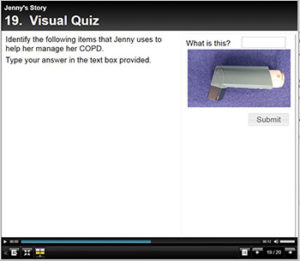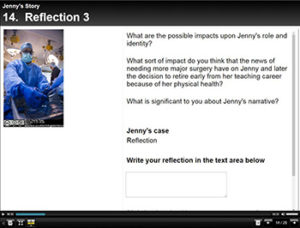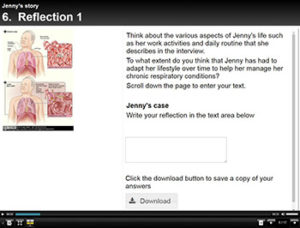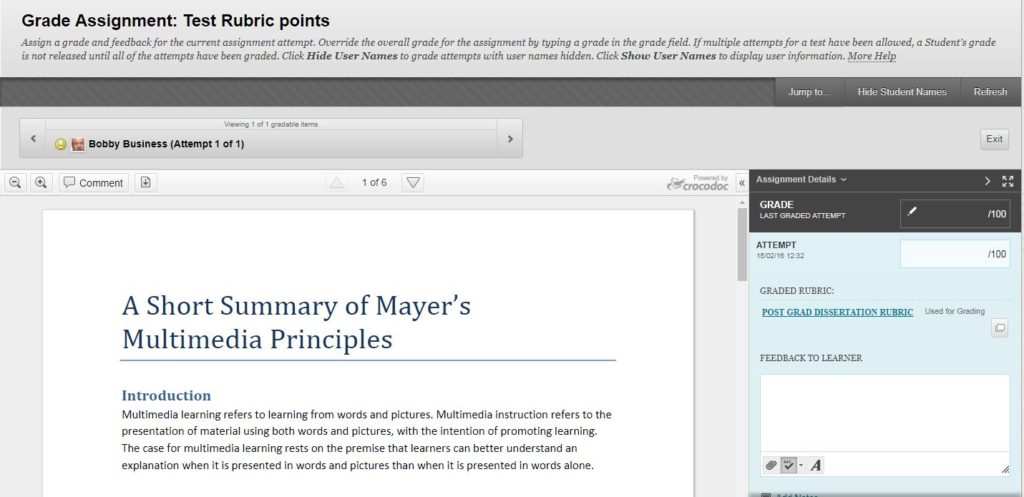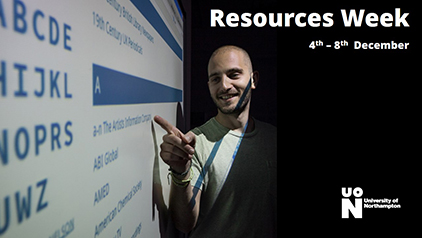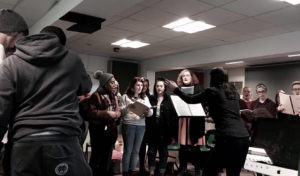As an advocate for using technology enhanced learning Senior Lecturer in Cross Cultural Management Diepiriye Kuku-Siemons discusses his motivations, process, and reflections for integrating mobile technologies into the classroom.
In this first video, he provides some guidance on how he facilitates the use of mobile technologies when students are working in groups and describes his role as a facilitator in learning sessions. The purpose of this video was to share his own thoughts about the use of mobile technologies in teaching and learning with the wider academic community via the UN Staff Facebook group.
His second video describes how using mobile devices allows students to interact with research in a more immediate and accessible way and advises that activities should be structured in a way that ensures students are mindful of the purpose of the learning activities and are not distracted by existing social media channels.
To give a full picture of the activity, students from the group volunteered to provide feedback of their experiences using mobile devices in the classroom.
The film was produced with Learning Technologist, Richard Byles, during two sessions; in the first session students used mobile technology for research and brought them back to the group for discussion. In the second Diepiriye facilitated a classroom activity in which students discussed how mobile technology provides both opportunities and challenges for business.
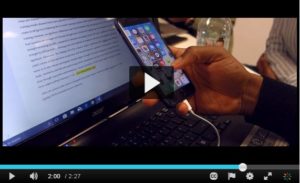
Click to view video – Using mobile technology in class with Diepiriye Kuku-Siemons
If you would like to see Richard Byles and Deipiriye Kuku-Siemons speaking about their ongoing work please register for the forthcoming LLS Conference on the 4th of May where they will be giving a presentation on ‘Facilitating mobile technologies in the classroom’.
On Monday 8th January around 1pm there was a routine housekeeping check on NILE to ensure that it was in line with the student record system data. Unfortunately, this did not work correctly and as a result, some students were made unavailable on sites. The students were not removed from the sites but just lost the ability to view these on their NILE list. Any assessment work previously submitted by the student to the site was retained.
The Learntech team along with IT Services worked on the problem as soon it was identified and finally corrected the problem for all students at 8pm on the 8th January. A number of students were directly in touch with the Learntech team during the afternoon / evening and access was restored for them during the day. We are working with the supplier to ensure that there is no repeat of this problem.
Kathryn Kendon has agreed that for students impacted by this problem with assignments due in 8th January and 9th January, revised deadlines of 10th January (for those with deadlines of 8th January) and 11th January (for those with deadlines of 9th January) will apply. The list of modules which were impacted by the problem have been identified and module leaders were contacted on Tuesday 9th January by the Student Records teams. The extensions will only apply to students impacted by the problem on the affected modules.
Welcome back and happy New Year from the LearnTech Team!
We are delighted to announce the new cycle of LearnTech lunchtimes. For those of you as yet unfamiliar with this training and as a reminder for everyone else, LT lunchtime sessions currently introduce some of our core NILE tools and some specific SaGE elements, including their potential applications and how these technologies can enhance your teaching and learning.
Please note, where more than one session per tool is being offered in the next cycle, the first (and where appropriate third) will be run in the Tpod at Park and the second offered virtually in a Collaborate virtual classroom. In addition, we will happily offer parallel sessions at Avenue Campus on a request basis; please contact Vicky Brown, Learning Technology Manager to arrange.
Please see below for the full schedule of offerings and booking links:
Kaltura/ MediaSpace (video)
Kaltura is the University’s single video solution; this is a chance for those who have already started to engage with this tool and those as yet to experience it. Areas covered include an introduction to MediaSpace; video capture using CaptureSpace; uploading video to MediaSpace; embedding video content in NILE; using quizzes in Kaltura.
Friday 19 January – 12:30-13:30 – Park Campus, Library, Tpod
Monday 12 March – 12:30-13:30 – Collaborate Virtual Classroom (link will become live ahead of session)
Tuesday 8 May – 12:30-13:30 – Park Campus, Library, Tpod
Please sign up here: http://bit.ly/2fWkTbG
Collaborate (Virtual Classroom)
This session will introduce those new to using online virtual classrooms (Northampton is licensed for Collaborate: Ultra Experience until 2020) as well as for those who are curious to learn about new functionalities now available in the tool. Topics may cover some of the following: setting up the tool in your NILE sites; inviting attendees; sharing files/ applications/ the virtual whiteboard; running a virtual classroom session; moderating sessions; recording sessions; break-out rooms.
Monday 12 February – 12:30-13:30 – Park Campus, Library, Tpod
Thursday 12 April – 12:30-13:30 – Collaborate Virtual Classroom (link will become live ahead of session)
Thursday 7 June – 12:30-13:30 – Park Campus, Library, Tpod
Please sign up here: http://bit.ly/2eG7mZR
Edublogs / MyPad (blogging tool)
Edublogs (MyPad) is the University’s personal and academic (WordPress) blogging tool and can be used in a number of ways to communicate and share learning resources. Topics covered may include: creation of individual / class student blogs; use of menus/ media; blog administration within modules; creation of class websites.
Wednesday 28 February – 12:30-13:30 – Park Campus, Library, Tpod
Wednesday 25 April – 12:30-13:30 – Collaborate Virtual Classroom (link will become live ahead of session)
Tuesday 19 June – 12:30-13:30 – Park Campus, Library, Tpod
Please sign up here: http://bit.ly/2f4BEUM
Assessments (Rubrics)
Have you heard about the use of rubrics in NILE and wondering what all the fuss is about? Want to find out how to grade your assessments electronically using rubrics? Curious to know how you can streamline your marking by using quantitative and/ or qualitative rubrics?
Come along to this LT lunchtime session to find out more about how to enhance and enrich feedback for your students using these tools in NILE.
Thursday 29 March – 12:30-13:30 – Park Campus, Library, Tpod
Please sign up here: http://bit.ly/2pNL0H8
Assessments (Groups)
Groups are a powerful tool in NILE that can be used to facilitate and manage group assignments, and enable communication and collaboration for students.
If you are interested in seeing how to easily create groups, set an assignment (e.g. Group Presentation or online Debate), AND potentially reduce administration and marking time, whilst still maintaining quality of feedback, then please sign up ….
Tuesday 30 January – 12:30-13:30 – Park Campus, Library, Tpod
Wednesday 23 May – 12:30-13:30 – Collaborate Virtual Classroom (link will become live ahead of session)
Please sign up here: http://bit.ly/2pNRmXb
In addition the following training sessions are currently scheduled for Xerte – N.B. these are 2.5 hours in duration:
Xerte (online content creation tools)
Xerte is a University supported tool used to create interactive e-learning and online content.
In this training session you will be introduced to the software templates, page types, features and tools available to enable you to produce an interactive e-learning session or online content provision.
You will also learn about the importance of instructional design for your e-learning and online content projects, and benefit from some useful hints and tips, technical advice and items relevant to developing e-content generally.
Park Campus, Library, LLS IT Training Room
Wednesday 24 January – 10:00-12:30 (LLS IT Training Room)
Thursday 1 March – 13:30-16:00 (LLS IT Training Room)
Wednesday 25 April – 13:30-16:00 (LLS IT Training Room)
Please sign up here: http://bit.ly/2fYwKpY
Spaces are limited, so do not delay, book today! Unable to attend on these dates? More will be offered on a rolling basis so watch this space. In the meantime, please visit our NILE Guides and FAQs.
The journey and the reflections
I was privileged to be invited to co-present with Liz Sear, Senior Lecturer, Foundation Degree in Health and Social Care, at the service user and carers forum on January 10th 2017 by Sara Simons, Senior Lecturer/Disability Co-ordinator Faculty of Health and Society.
Liz and I had previously developed an e-learning package following the story of ‘Fred’, a fictitious character. ‘Fred’ is a homeless man whose journey to hopeful recovery exposed service provider and healthcare involvement. This online case study supported students’ understanding of inter-professional and multi-agency working.
Satisfying the need to present complex information in a clear and understandable way to Health and Social Care students, we demonstrated how effective this online learning had been.
There is nothing better than a ‘real-life’ story for students to learn from, and with this in mind, we invited service users to get involved by sharing their story with us and give us their permission for their story to be told in online e-learning packages for students to access for their studies here at the University.
A service user put herself forward as a willing contributor and subsequent plans were put in place to audio record the service user telling her story. Liz and Anne worked together on storyboarding and building the two e-learning packages using Xerte software.
Sara Simons
Chronic Obstructive Pulmonary Disease (COPD) is the name for a group of lung conditions that cause breathing difficulties including chronic bronchitis, emphysema and chronic obstructive airways disease. People with COPD have trouble breathing in and out, due to long-term damage to the lungs, usually because of smoking. COPD (bronchitis and emphysema), affects an estimated 3 million people in the U.K. (NHS, 2015).
We were interested to learn about the physical and psychological implications upon an individual’s day to day life and levels of activity in living with a long term condition. As co-production is key to developing quality the Health and Social Care (Care Act, 2014), as supported by NUSU 4Pi National Standards, Nothing about Us without Us (2015), involving the service user in all aspects of the production was fundamental to the project.
Jenny was happy to be involved, and following a thorough briefing of what this would entail, Jenny used prepared guidelines of questions to structure her answer. Full written consent was provided by Jenny to record and use her story for student learning purposes. Using a structured interview format, audio recording took place and key props used by Jenny were photographed to support her narrative.
Once the recording was adapted into the story board format Sara acted as a critical friend to the layout, format and directed learning tasks. Once recommendations were adopted, Jenny was asked for her views and opinions and further editing took place. User testing was undertaken by a number of students who piloted the packages.
Liz Sear
In terms of my experience of working on this project I feel that it has left me with an enormous sense of admiration for the service user Jenny in terms of the challenges that she has had to face and overcome in her life, I think that she is very courageous person. It has also been a timely reminder that alongside the theory about the health and social care topics that we teach our students there is always a person whose story is unique and which reminds us that people do not experience ill health in the same way. As practitioners we need reminding of this so that we can strive to see things through the eyes of another person while not making assumptions about who people are, what they need from us and the reasons why they may behave in the way that they do. I feel that to do this successfully we must be prepared to be humble, as practitioners we can never ‘know it all’ and service users will often present us with insights about their experiences that can challenge our beliefs and prompt us to reflect upon our practice on a much deeper level.
Further information
Upon reflection, this has been an effective learning opportunity for all the contributors and we look forward to developing further packages this year.
Special thanks go to Jenny, who commented upon the fact, that this had been a really positive and rewarding experience.
Anne Misselbrook, Liz Sear and Sara Simons
Student Feedback
“I found this package very engaging and informative”.
“Found the package very interesting and emotional to find out how much Jenny had been through in her life”.
Further to our post advising on forthcoming changes to inline grading in Blackboard (NILE), a reminder that the new service, New Box view, will be available from 3 January 2018.
In preparation for this, LearnTech has begun to publish some FAQs for staff and students to provide further guidance on some of the functionality of the new tool which you are welcome to view now and of course to refer back to when the new system goes live.
Upcoming changes to Inline Grading
The third party service (known as the Crocodoc plug-in) used by Blackboard’s inline grading tool is being discontinued and replaced. If you are using Blackboard’s inline grading to give students feedback, this information is for you.
Box, the provider of the service used by inline grading, have announced that Crocodoc will no longer be supported after 15 January 2018, and that all users will therefore need to start using the replacement, New Box View.
What is inline grading?
Inline grading is the ability to use a web browser to annotate student attempts on a Blackboard assignment. The screenshot below shows a student’s assignment attempt:
Are you affected by this?
You are only affected if you use Blackboard assignments to collect and feedback on your students’ work, and if you use the inline grading tools to annotate.
The ‘Feedback to Learner’ box (right hand side of the screenshot, above) is not affected.
Does this apply to Turnitin?
No, Turnitin is a separate plug-in.
What is going to happen next?
The LearnTech team have been testing the New Box View, as well as how it will affect the other features of Blackboard, prior to making the switch.
We will update you with further guidance via the LearnTech blog prior to switching over, so watch this space.
New Box view will be activated on 3 January 2018; we wanted to give you some advanced notice so that you can make any necessary adjustments, as guided by the following information.
What about existing work marked in Crocodoc?
Any assignments currently graded with the Crocodoc function will be migrated automatically over to New Box View.
|
⚠ |
Annotations made in Crocodoc will not be editable once they have been migrated to New Box View– they will be burned into the document.This applies to all existing annotations on a submission in Crocodoc – regardless of whether it has yet been released to students or not. |
What will change?
| Comparison of New Crocodoc and New Box View | ||
| Crocodoc | New Box View | |
| File types | .pdf, .ppt, .pptx, .xls, .xlsx, .doc, .docx | Over 100 different file types |
| Annotation types | Text and point-based comments, highlighting, and drawing | Point-based comments and highlighting |
| Download | You can download a copy of a student file with the option to download in the original format or in a PDF version that includes the annotations | You can download a copy of a student file, but annotations won’t appear |
Where can I read more?
Blackboard’s Help site has more detailed information on the transition from Crocodoc to New Box View.
As previously mentioned, we will be posting more information on the LearnTech blog, as well as the NILE welcome page for staff.
Who can I contact?
Contact the Learntech Support team with any questions: learntech@northampton.ac.uk.
Just a couple of weeks to go before Resources Week takes place on both of our campuses.
This event is for everyone to enjoy and will include resource demonstrations from providers such as Sage, Taylor & Francis and Mintel, as well as supplier stands, competitions and free donuts (look out for Donuts & Digital Resources on the Tuesday).
Please come along and join in and encourage your students to sign up to some of the sessions and find out what digital resources are available to help them with their research.
There are timetables for both campuses – just follow the links within the timetables to book on any of the sessions that interest you. Whether you are a staff member, a student or a researcher, there really is something for everyone!
Joanne Farmer and Hannah Woods
 The move to Waterside is fast approaching, and there are a number of important deadlines this year for us as staff members getting ready for the move. With this in mind, here’s a quick timeline that tries to pull together what’s happening when in preparation for the move. It’s intended to help you see what help is available to you, to support you in meeting these deadlines, and also how you might be able to use some of this work towards another target many of you have for the year – gaining your HEA Fellowship.
The move to Waterside is fast approaching, and there are a number of important deadlines this year for us as staff members getting ready for the move. With this in mind, here’s a quick timeline that tries to pull together what’s happening when in preparation for the move. It’s intended to help you see what help is available to you, to support you in meeting these deadlines, and also how you might be able to use some of this work towards another target many of you have for the year – gaining your HEA Fellowship.
Download the map: Supporting key milestones towards Waterside [PDF]
Of course, different members of staff will have different targets and priorities, and not all of these are reflected here. Some Faculties and subject groups might also have their own internal deadlines for institutional projects like the UMF Review, so always check if you’re not sure. We’ve tried to capture the ones that are generally relevant to most academic staff, but if we’ve missed any, please let us know!
By Dr. Jasmine Shadrack, Senior Lecturer in Popular Music, FAST
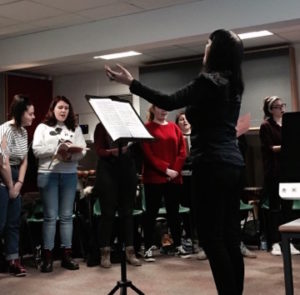 As this year’s choir have been asked to perform at the opening ceremony of Waterside, as well as our own performance at the Royal next June, it was important to choose a piece of music that had the wow factor. And for me, that has to be Mozart’s Requiem Mass in D Minor. It was the first piece I ever conducted so I have very fond memories of it. I have also performed it myself as a soprano during my undergraduate degree so my knowledge of it is intimate. The fact that Mozart knew he was dying when he wrote it, makes the piece all the more poignant and special.
As this year’s choir have been asked to perform at the opening ceremony of Waterside, as well as our own performance at the Royal next June, it was important to choose a piece of music that had the wow factor. And for me, that has to be Mozart’s Requiem Mass in D Minor. It was the first piece I ever conducted so I have very fond memories of it. I have also performed it myself as a soprano during my undergraduate degree so my knowledge of it is intimate. The fact that Mozart knew he was dying when he wrote it, makes the piece all the more poignant and special.
The music for it will take a longer time to come together but the choir are making great strides already. We have completed (in the most part!) the Aeternam and the Kyrie Eleison (the first two movements) as well as learning some traditional Christmas carols too (for a lunch time concert later in the term). This time I am joined by a new member of staff, Miss Francesca Stevens who does a two hour vocal training session a week to support what I do every Monday in choir rehearsal. Already I have noticed the bond starting to form, not just between each section of the choir, but as a unit too. One of the things I love most about doing this is watching everyone work together for a common goal. It is active blended learning at every stage, from the rehearsals all the way through to the performance. Not only do they learn close score reading, sight reading , close part harmony, how counterpoint functions, effective breathing techniques, good pronunciation, professional conduct and critical listening, they also forge real solidarity as a cohort that spans across all years of the popular music undergraduate degree.
They are able to exercise their own autonomy by using their voice. This might sound simplistic but it really helps to acknowledge that one voice can have a huge impact on a choir. Through their subjective involvement, they take part and contribute to an objective goal so it is experiential. They also gain empowerment through their learning community. As the choir is voluntary, it means that they are there because they want to be and they are not doing it for assessment purposes. I have tried making it assessable previously and it just didn’t work; it actually undermined all the camaraderie and fun we have with it. There is a real sense of inclusivity too that reflects on their personal responsibility to the choir.
So, at week three of the choir in term 1, we are making great progress and having fun at the same time!
Jasmine will be keeping us up to date with the progress of the choir, but this post is also one in a series of ABL Practitioner Stories, published in the countdown to Waterside. If you’d like us to feature your work, get in touch: LD@northampton.ac.uk
By Nick Cartwright, Senior Lecturer in Law, FBL
I was at a meeting of people involved in various ways in staff development of lecturers and as we as an institution had adopted Active Blended Learning (ABL) as the ‘new normal’ I found myself asking in our break-out group: “ABL WTF?” The response was roughly along the lines of “it’s what you do Nick” and several conversations later I was invited to write this blog post about what I do in the classroom and why.
Firstly, one of the most important answers to the why I teach the way I do is because I enjoy doing it this way and it works well for me and what I teach. I certainly don’t think it’s better than other approaches and I don’t know if it would work for every tutor or every subject.
So, I know what works for me now but it was a long journey. I started teaching the way I was taught within the straight-jacket of institutional policy where I then worked, we had a lecture then a seminar every week for ever every module. The lecture was recorded on VHS tapes and stored in the library, the technology meant I had to use PowerPoint and stand stock still behind the lectern. The hour-long seminars I inherited required that in week 1 we asked the students to read chapter 1 of the assigned text, week 2 was chapter 2 and so on. Students were instructed to answer roughly 10 questions and bring hard copies of their answers. I ran a tight ship, students who turned up unprepared were told to leave – my classroom was an exclusive space for the students that were the easiest to teach. We had roughly 5 minutes on each question then left, job done.
Later in my career, at a different institution, I sat in a staff meeting listening to colleagues report that the foundation students had “gone feral” – a chair had been thrown, a lecturer threatened and they simply would not sit down in two straight rows, shut up and listen as wisdom was dispensed. Of course they wouldn’t, despite being bright and capable and having gone through 13 years of formal education they were in the foundation year because they hadn’t achieved the two D’s necessary to enter straight onto the degree programme. Bored with PowerPoint I found myself eagerly volunteering with a colleague to take on these students who we were to later find out were some of the brightest, most enthusiastic students we’d ever had the pleasure of teaching.
 One student in feedback tagged our efforts ‘sneaky teaching’ because without realising it they were learning, we tagged it ‘learning by doing’ and at validation the external panel members commended it. In one module the students formed political parties and competed to be elected, in another they witnessed a train wreck and were the lawyers trying to support the victims, at the end arguing before the European Court of Human Rights that one client had the right to die. We didn’t tell them anything, clients sent letters, senior partners sent emails and we patiently waited for them to ask us to direct them to a source or take through a topic area. That we learn best by doing is nothing new, the Ancient Greek philosophers key principle was that dialogue generates ideas from the learner: “Education is not a cramming in, but a drawing out”1. I came to Northampton burning with a passion to get my students learning by doing because it works and because it engages many students who have been excluded by traditional schooling.
One student in feedback tagged our efforts ‘sneaky teaching’ because without realising it they were learning, we tagged it ‘learning by doing’ and at validation the external panel members commended it. In one module the students formed political parties and competed to be elected, in another they witnessed a train wreck and were the lawyers trying to support the victims, at the end arguing before the European Court of Human Rights that one client had the right to die. We didn’t tell them anything, clients sent letters, senior partners sent emails and we patiently waited for them to ask us to direct them to a source or take through a topic area. That we learn best by doing is nothing new, the Ancient Greek philosophers key principle was that dialogue generates ideas from the learner: “Education is not a cramming in, but a drawing out”1. I came to Northampton burning with a passion to get my students learning by doing because it works and because it engages many students who have been excluded by traditional schooling.
I had started out teaching some more practical topic areas so the ‘doing’ was quite easy to work out but last week I found myself in a first-year workshop dealing with the issues of the nature of law and specifically feminist and queer theory approaches. It was when discussing how that had gone that I was asked to write down how I had done it.
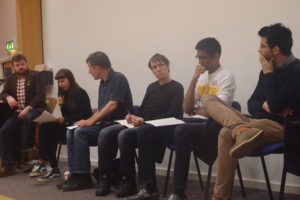 The session needed to get the students to grasp that there are different critical voices within (and outside of) feminism and to get to grips with the skill of applying different perspectives to the law – what they applied the law to was less important. The workshop was two hours long and there were three questions to discuss, we ran out of time in every session and every session was completely different. I could have worried about equality of learner experience, ensuring every student in every session got an identical set of correct notes, and in my younger days I would have done, but my students did get equality of learner experience. They got to choose the lenses through which we discussed the issues, for example one group focused on issues of consent and sexual touching in a social setting, another on the lack of diversity in the judiciary and another on whether the dominant narratives around immigration were racist. It was relevant to all of them rather than just those who related to the lens I would have chosen which would likely be white, male and straight.
The session needed to get the students to grasp that there are different critical voices within (and outside of) feminism and to get to grips with the skill of applying different perspectives to the law – what they applied the law to was less important. The workshop was two hours long and there were three questions to discuss, we ran out of time in every session and every session was completely different. I could have worried about equality of learner experience, ensuring every student in every session got an identical set of correct notes, and in my younger days I would have done, but my students did get equality of learner experience. They got to choose the lenses through which we discussed the issues, for example one group focused on issues of consent and sexual touching in a social setting, another on the lack of diversity in the judiciary and another on whether the dominant narratives around immigration were racist. It was relevant to all of them rather than just those who related to the lens I would have chosen which would likely be white, male and straight.
The biggest challenge is letting go and empowering students to find their own way through the issues, generating authentic knowledge which may be different from or even challenge my knowledge. Practically it also involves what I dubbed in chats ‘double thinking’, keeping two chains of thought going at once. One half of my brain is following the students journey, sometimes disappearing down the rabbit hole, whilst the other is focused on what we need to cover and trying to keep an overview of the topic all the time working out what questions I need to throw out to keep the two tracks running in the same direction – if I lose the latter the session suddenly loses any sense of direction and this disengages my students. It’s more challenging and more tiring than how I used to teach, but I believe it is a better, more inclusive experience for my students. I wonder what I’ll be doing 10 years from now and how critical I’ll be of what I do today?
1Clark, D., ‘Socrates: Method Man’ Plan B [online] http://donaldclarkplanb.blogspot.co.uk/search?q=Socrates [accessed 4 October 2013 @ 14:37]
This post is one in a series of ABL Practitioner Stories, published in the countdown to Waterside. If you’d like us to feature your work, get in touch: LD@northampton.ac.uk
Recent Posts
- Blackboard Upgrade – March 2026
- Blackboard Upgrade – February 2026
- Blackboard Upgrade – January 2026
- Spotlight on Excellence: Bringing AI Conversations into Management Learning
- Blackboard Upgrade – December 2025
- Preparing for your Physiotherapy Apprenticeship Programme (PREP-PAP) by Fiona Barrett and Anna Smith
- Blackboard Upgrade – November 2025
- Fix Your Content Day 2025
- Blackboard Upgrade – October 2025
- Blackboard Upgrade – September 2025
Tags
ABL Practitioner Stories Academic Skills Accessibility Active Blended Learning (ABL) ADE AI Artificial Intelligence Assessment Design Assessment Tools Blackboard Blackboard Learn Blackboard Upgrade Blended Learning Blogs CAIeRO Collaborate Collaboration Distance Learning Feedback FHES Flipped Learning iNorthampton iPad Kaltura Learner Experience MALT Mobile Newsletter NILE NILE Ultra Outside the box Panopto Presentations Quality Reflection SHED Submitting and Grading Electronically (SaGE) Turnitin Ultra Ultra Upgrade Update Updates Video Waterside XerteArchives
Site Admin





